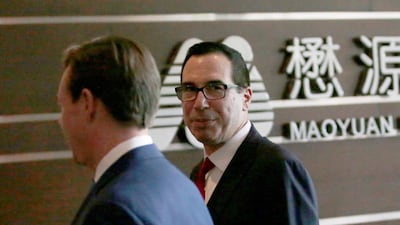The US trade war with China is “on hold” after the world’s largest economies agreed to drop their tariff threats while they work on a wider trade agreement, Treasury secretary Steven Mnuchin said on Sunday.
Mr Mnuchin and president Donald Trump’s top economic adviser, Larry Kudlow, said the agreement reached by Chinese and American negotiators on Saturday set up a framework for addressing trade imbalances in the future.
“We are putting the trade war on hold. Right now, we have agreed to put the tariffs on hold while we try to execute the framework,” Mr Mnuchin said in a television interview on Fox News Sunday.
On Saturday, Beijing and Washington said they would keep talking about measures under which China would import more energy and agricultural commodities from the United States to narrow the $335 billion annual US goods and services trade deficit with China.
During an initial round of talks this month in Beijing, Washington demanded that China reduce its trade surplus by $200 billion. No dollar figure was cited in the countries’ joint statement on Saturday.
The Chinese Embassy in Washington did not return a request for comment on Mr Mnuchin’s statement.
Tension between the two sides has been growing since the Trump administration proposed tariffs of $50 billion on Chinese goods and said it might extend the levies to an additional $150 billion. China responded with its own measures targeting US agriculture.
The top US trade official, Robert Lighthizer, said that getting China to open its market to more US exports was significant, but that it was far more important for the United States to resolve issues with China such as forced technology transfers and cyber theft.
“Real structural change is necessary. Nothing less than the future of tens of millions of American jobs is at stake,” Mr Lighthizer said in a statement on Sunday.
In response to Mr Mnuchin’s comments, Democratic Senator Chuck Schumer of New York, a frequent Trump critic, said he thought it would be a mistake for Trump to settle for “a promise to buy goods” with so many larger issues on the table.
“If President Xi is going ... to fail to take strong actions on intellectual property, cyber theft, and American companies having free access to sell goods in China ... we will have lost,” Mr Schumer said.
Mr Kudlow told CBS Face the Nation it was too soon to lock in the $200 billion figure for China’s promised purchases. “The details will be down the road. These things are not so precise,” he said.
In addition, he told ABC’s “This Week” that the broader issues were still in play, and that China had “structural reforms” such as lowering tariffs and non-tariff barriers that will allow the United States to boost exports.
Trump was in a “very positive mood about this,” Mr Kudlow said.
However, he said there was no trade deal yet reached.

